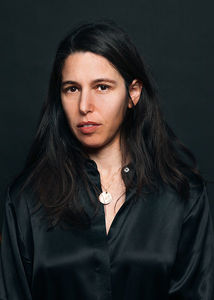Tamara Faith Berger on The Happy Hooker, Judy Blume, & Her Fantasy Pick for Canada Reads
There's nobody quite like Tamara Faith Berger, whose striking, smart, erotic, and memorable writing upends every CanLit stereotype and has won her legions of devoted readers.
She returns this fall with her new novel, Queen Solomon (Coach House Books), which follows the chaos caused by Barbra, an Ethiopian Jew who came to Israel as part of Operation Solomon, a real life military action in 1991 that moved over 14,000 Ethiopian Jews, who were considered to be in danger in their home country, to Israel.
Years after the operation and now a teen, Barbra is invited to stay for the summer at the home of the novel's teenage narrator by his parents. Soon the two are embroiled in a toxic, electrifying psychosexual tug of war as Barbra pushes the narrator further and further. But just as things reach a fever pitch, Barbra disappears. When she shows up seven years later, she fractures the narrator's life all over again, threatening the stability he's built since their last erotic, destructive time together.
It's a book readers won't be able to put down, and we're incredibly excited to celebrate its publication by welcoming Tamara to Open Book to tell us about the books that have shaped her as a writer and a reader. She recalls the iconic memoir of sex work that shaped her early reading and thinking, takes us back to her Judy Blume years, and names the literary trope that bugs her the most.
The WAR Series: Writers as Readers, with Tamara Faith Berger
The first book I remember reading on my own:
Bonnie McSmithers You're Driving Me Dithers (1974) by Sue Ann Alderson alongside Alexander and the Terrible, Horrible, No Good Very Bad Day (1972) by Judith Viorst. Both books promised that they understood my bad moods and that my mother would not desert me even if I cut up her clothes. Both books also promised a normalizing, restorative conclusion to the day, gently inserting the parental point-of-view: I don't like your behaviour but I love you. I think that this message could probably be recouped: don't hate the angry, sensory mess of your kid. Just give it a lid.
The first adult book I read:
Xaviera Hollander's The Happy Hooker (1979) – memorable for my first education about swinging and sex work. I remember grappling with the notion that Dutch people were incredibly sexually frank and that a woman could make a living having sex. Clicking around now, I see that Hollander has written seventeen books, including Child No More (2002) which recounts her coming-of-age with two complicated parents: a seemingly classical Electra complex with her father and imprisonment in an internment camp in Indonesia with her mother. The synopsis of Child No More reports a defining childhood incident for Hollander in which her mother forced her father to check if her hymen was intact. After this breach, Hollander's relationship with her parents grew even weirder: Hollander's father put her over his knee when she was teenager, spanking her for having sex. When her father announced that his punishment was done, Hollander begged him to continue. "The experience was orgasmic," the synopsis reveals, "which must have infuriated her outraged mother." This synopsis, I am guessing, was penned by Hollander, hinting that being a whore in the 70s meant that maybe there was no such thing as normalizing parental boundaries, i.e., no lid.
A book I feel strongly influenced me as a writer and why:
I was likely most influenced by Georges Bataille's, Story of the Eye (1928) because of its articulate explicitness, but I didn't read that book until I was in my twenties. Before that, I read Deenie (1973) by Judy Blume – the story of a teenager with disfiguring scoliosis who, if I remember correctly, had a predilection for cashmere and being felt up in slow dances. What I think I'm actually remembering is Deenie's plaster, corrective, neck to hip body brace, visible under her sweater in a full-length closet mirror and the subterranean desire to be unhooked. Blume wrote Deenie's lust as a more solid impediment than the brace. As a teenager, of course I read the whole oeuvre from Deenie to Forever – full of peeping Toms and overbearing mothers, soaked pads and surefooted masturbation. Blume is undeniably the master of shame.
A book that made me laugh out loud:
Problems (2016) by Jade Sharma: the most serious work of female masochism in the canon. Also LOL-ed at her forthcoming novella A Million Blows which is about a bisexual, army brat, porn-dealing ringleader.
The best book I read in the past six months:
Brother by David Chariandy back-to-back with The Pisces by Melissa Broder.
The book I plan on reading next:
Sludge Utopia by Catherine Fatima.
Your CanLit News
Subscribe to Open Book’s newsletter to get local book events, literary content, writing tips, and more in your inbox
A book I loved that I think has been overlooked:
Little Fish by Casey Plett. I think it should be on Canada Reads. Call me because I'll defend it like this: witchy, relentless trans lore with no fortifying, pan-Canadian moral to the story.
The commonly used literary trope that ruins a book for me:
Cut to black after they hit the sack.
Author photo credit: Yuula Benivolski
________________________________
Tamara Faith Berger was born in Toronto. She wrote porn stories for a living and attempted to make dirty films before publishing her first book, Lie With Me, in 1999. It was made into a film in 2004. In 2001, A Woman Alone at Night was published. These two novels were collected in Little Cat. Her third book, Maidenhead, won the 2012 Believer Book Award. She is also the author of Kuntalini and is writing for film and television.





